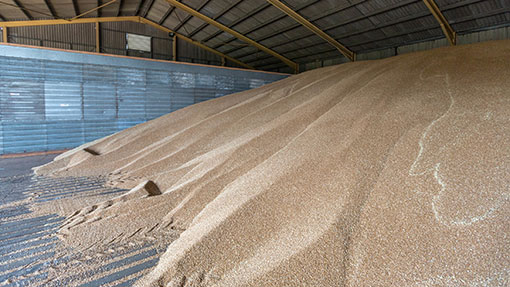Harvest round-up: Dryers on full power

Farmers are still snatching crops between the showers, with dryers on full speed to keep up with harvest.
In Kelso, John Jeffrey was busy combining winter wheat at Kersknowe Farm, and was extremely pleased with yields so far.
“Thankfully we’re into a good spell of weather – it’s bizarre how localised the showers have been,” he said.
“One farm five miles away has finished harvest, and got it all below 18% moisture, but here I’m struggling to get anything below 18%.”
Harvest was progressing in Scotland, with some areas recording their earliest season while others were still being held back by ground conditions following Hurricane Bertha.
In Laurecekirk, Andrew Moir had finished combining winter wheat at Thornton Mains. “Oilseed rape is in the ground and spring barley is getting swept up – all with reasonable yields and quality,” he said.
But north of Aberdeen and in Morayshire, the ground conditions were still holding progress back.
See also: All the news, videos and harvest resources on our Harvest Highlights page.
Further south, Ian Branstone was busy unblocking his grain dryer at Bourton Hill Farm, Bourton-on-Water, Gloucestershire, as he tried to keep pace with the combine.
“Harvest is going slowly at the moment, but we’re getting on relatively well,” he said. “We had some wheat that had gone flat, so we prioritised that and have got it in the barn.”
Yields had been good, with Santiago producing 11-12t/ha and some Dickens at 13t/ha. “It’s just unbelievable.”
In Kent, Martin Boulden was busy spraying off stale seedbeds at Court Lodge, Aldington, Kent, as it was too wet to get on combining or drilling today (27 August).
“It’s been very frustrating – we started harvest on 2 July and will still be harvesting on 2 September; it’s just been very stop-start,” he said.
However, yields had been good, with Claire winter wheat averaging 10.4t/ha across the farm, and Hereward producing 8.6t/ha. “We’re very pleased with that.”
Wheat exporters were working hard to find new buyers of good quality wheat, but securing high value homes for the UK’s crop was likely to be a slow process, said Cecilia Pryce, head of research at Openfield.
Based on HGCA trial results, wheat yields were around 20% above the five-year average, which – if replicated in commercial crops – could result in a massive 17m tonne UK wheat crop.
Depending on final yields and domestic requirements for the ethanol industry, that would leave an exportable surplus of in the region of 3m tonnes this year.

